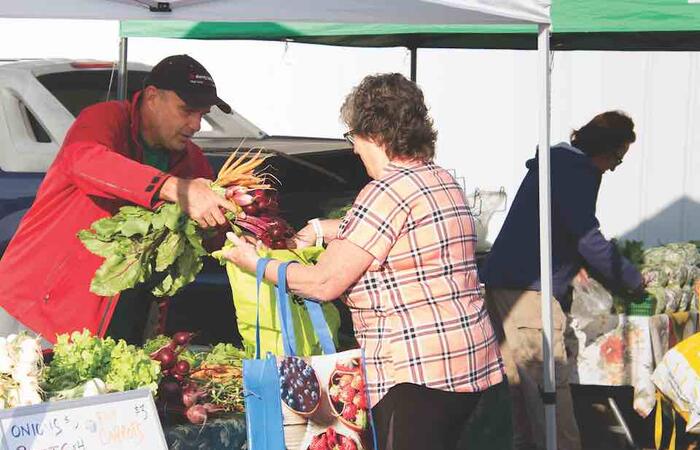Let’s face it: Global warming, aka climate change, is here.
Everyone has what scientists call a carbon footprint. It’s the total amount of greenhouse gases, including carbon dioxide and methane, that is generated by what we do. The average Canadian emitted 15.22 metric tons of carbon dioxide in 2022, placing us eleventh in the world, with China at the top of the ladder and the Faeroe Islands on the bottom.
Now there’s lots of reasons why Canada is where it is on this world scale. Many of us have cold winters to deal with and we are a very large country .with lots of empty distance between major cities, but we can still do our part as individual citizens to make a difference.
So that’s why Bayview went to the Thunder Bay Country Market to see what local farmers and consumers are doing to make our world a better place.
If you’re wanting garden produce that contributes to the world’s good health, Mika’s owned by Mika Dimitrijevic, Mama’s Good Food, Hofland Farms run by Nicole Lagrange and Kevin Hofland, DeBruin’s Greenhouses, and Pitch Creek Farm managed by Branden Harris, all strive to be as organic as possible.
Pitch Creek boasts that it doesn’t use any synthetic herbicides, pesticides or fertilizers and puts a lot of stock in its chicken s—t fertilizer that gives plenty of nourishment to all of their produce.
A sign at Hofland Farms’ stand states clearly: “No Cides Here” and Mama’s Good Food uses hoops and Agribon row cover to keep their produce free of pests – that tend to eat those nasty little holes in the leaves – and weeds – that choke the produce and take valuable nutrients from the soil. Mika’s uses cow manure and good old-fashioned weeding and maintains it is all natural: No pesticides, no herbicides, just pure natural garden produce. DeBruin’s Greenhouses, run by Henriet and Arjen DeBruin, grow their tomatoes and cukes without the use of pesticides and use biological control to keep the bugs at bay – in short, they bring in good bugs to control the bad ones.
Now if it’s meat, eggs, and dairy you want, there’s plenty of businesses at the Country Market – all striving to be organic and produce their own feed, therefore reducing their carbon footprint.
Walkabout Farm’s eggs are produced by free run chickens that don’t have to live in the confines of a cage, and are fed a grain ration from the Thunder Bay Co-op. Their sheep cheese is produced locally with the milk from their livestock and processed just down the road from their farm. Their partner farm, owned by their son Robert Groenheide, raises cows that are fed a grain ration that is grown and produced on their farm, and strive to be as organic as possible. “We want this beef for ourselves and our neighbours – so although we’re not certified organic, we are very cautious,” Jenny Groenheide maintains.
My Pride Farms owned by Mike Visser offers veal, rabbit, and lamb that is hormone free and raised locally, and provides the same cuts as any other grocer. Cornell Farms has free run chickens, and beef that is grass fed. Thunder Oak Cheese Farm offers a large variety of – you guessed it – cheese – brought to you by two brothers and their wives. Martin and his wife Charmaine run the dairy farm while Walter and his wife Joanne produce
the cheese.
If it’s milk, butter, Greek yogurt, and ice-cream you want then head over to Slate River Dairy’s booth owned by Jim and Wilma Mol. Almost everything is sold in reusable, returnable glass jars and containers, working towards eliminating the use of those nasty plastics. Wilma maintains that their cows live in a free stall barn and are fed forage grown on their farm. They also sell cocoa milk, tzatziki, and a delicious blueberry “cheezzcake” that you can treat yourself to.
To round off your grocery list, you can check out Prosperity Blends where Leafy and Melony offer everything from lentils to sunflower seeds, almonds to cashews, and spices that are, for the most part, organic and locally produced when possible. And then there’s Bears Bees and Honey that offers 100% pure unpasteurized local honey for your baking and sweetening needs.
So, there’s a little food for thought. We can all do our part to help our environment just by changing our grocery shopping habits. The world will thank you and the next generations to come will do the same.







